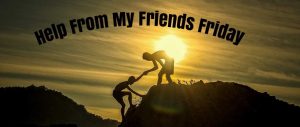 Readers, my guest today is Karen Albright Lin, who not only is a brilliant author, screenwriter, and speaker, she’s also an exceptional “foodie.” I hope you enjoy this poignant and straightforward article about her China adventure as much as I did. Please welcome Karen to Help From My Friends Friday. ~ Donnell
Readers, my guest today is Karen Albright Lin, who not only is a brilliant author, screenwriter, and speaker, she’s also an exceptional “foodie.” I hope you enjoy this poignant and straightforward article about her China adventure as much as I did. Please welcome Karen to Help From My Friends Friday. ~ Donnell
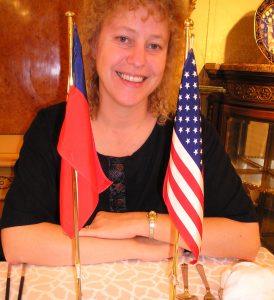
Author Karen Albright Lin
by: Karen Albright Lin
My husband, Wen, and I are travelers of the world. Before the pandemic we visited a few new countries every year. Wen is from Taiwan, which, at the time, was not particularly good friends with China. But he speaks Mandarin and we were told all the rumors of kidnappings and disappearances were grossly exaggerated. There’s power in numbers, they say. So we went to China for the first time with a busload of friends and family, lots of family, including our two boys and my grandmother, who huffed and puffed with her COPD all the way through bumpy city sidewalks—first in Shanghai, a wondrous mix temples, gardens, and towers. The architecture there was an eclectic mix of old Europe and modern day China. And food, oh the food. It started me down the road of writing a literary cookbook, now years in the making.
But I digress.
(The entire trip could be narrated just through the food we tried from scorpions to stir-fried sticks of some sort. But not everybody is obsessed with food as I am, so I’ll tell you about other things we experienced in China.)
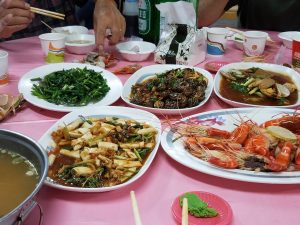
We smoothly drifted along brown waters on a Yangtze cruise. We stopped along the way in Fengdu Ghost City, what would later be inspiration for one of my collaborative screenplays. We spent time in Wuhan (of recent COVID-19 fame) and enjoyed a simulated ride through the many levels of hell where carved men were spun and ground up in barrels. All the while, angry Gods with sharpened teeth and snakes around their necks oversaw the spinning men and numerous other forms of torture.
We stopped along the way to study the Yangzte river rock and grabbed a few to take back as souvenirs. We still keep them in water to show off their beauty. A highlight of the cruise was a stop at the half-finished Three Gorges Dam. We learned about the engineering of the world’s largest hydroelectric behemoth, but not the less politically comfortable 2 million displaced farmers, flooded 300 BC artifacts, and many less foreseeable issues like sludge buildup and the loss of rare species like the white dolphin. It was a mighty thing to behold and, with its concurrent controversies, great fodder for a screenplay.
A week later, in Beijing, we visited Tiananmen Square, location of the 1989 massacre of protesters. It happened the year my first son was born and I remember being glued to the TV as the horror unfolded. As we walked on the same grounds where many had died, our guide gave me an evil eye and stern warning when I brought up that tender history to clarify which road the tanks came in on for a novel I was working on at the time.
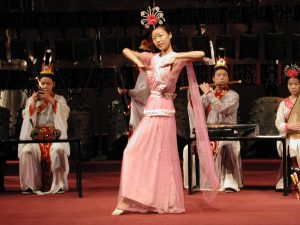 Then there was the Great Wall. We huffed and puffed through thick mist up ancient stairs, each of a different and often challenging height. It was like climbing along a crooked-spined dragon (fodder for the end of one of my novels). My poor grandmother had to sit in the bus, unable to join us in our exercise. One of the few things big enough to be seen from outer space, it is a marvel worth traveling for. Also in Beijing, we meandered through the Forbidden City where I imagined concubines sweet-walking their robes and painted faces about. As we left, we were shocked to find a Starbucks (since removed we hear). We ate coffee ice cream, not for the familiarity, but because it was scorching hot that day. We took some to Grandma.
Then there was the Great Wall. We huffed and puffed through thick mist up ancient stairs, each of a different and often challenging height. It was like climbing along a crooked-spined dragon (fodder for the end of one of my novels). My poor grandmother had to sit in the bus, unable to join us in our exercise. One of the few things big enough to be seen from outer space, it is a marvel worth traveling for. Also in Beijing, we meandered through the Forbidden City where I imagined concubines sweet-walking their robes and painted faces about. As we left, we were shocked to find a Starbucks (since removed we hear). We ate coffee ice cream, not for the familiarity, but because it was scorching hot that day. We took some to Grandma.
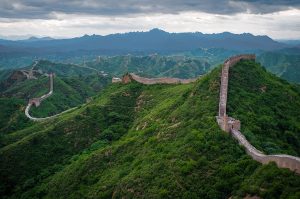
By Severin.stalder, CC BY-SA 3.0, https://commons.wikimedia.org/w/index.php?curid=39661035
We settled in for a few days in a hutong, a narrow alley where one can see a bit of the past, the old lifestyle of ordinary Beijingers. Formed during the Yuan Dynasty in the 1200s, hutongs are where one can find people hovering over their steaming woks beside courtyards that grace the center of tiny stone homes and neighborhood bathrooms that are shared outhouses with rows of benches with holes cut into them for doing one’s business. Privacy is not a priority. The people are poor but warm-hearted there. Sadly, their lifestyle is disappearing. In their heyday there were several thousands of them, but almost 90% have been destroyed to make way for modernization. And of those, most have become tourist attractions. Ours was more of a living neighborhood. Our tiny “hotel” rooms had showers that only dripped water every few seconds; it made us appreciate the difference in the cultures within and outside the hutongs.
Then came the highlight of the trip: climbing Yellow Mountain. It would later become my inspiration for a story about love and danger and Chinese superstition. We ascended a narrow, scree-blanketed path, slowly in a long line. Grandma bumped along in a sedan chair carried by two wiry, scrambling men.
One doesn’t typically connect the words “lock” and “enchantment.” But that unlikely union is what we found at this lush World Heritage site in Huangshan in eastern China. A mile above sea level, people go to the top of Yellow Mountain to literally hang their wishes. Explained in legends, and having inspired poets over the centuries, hundreds of brass locks dangle like ornaments at the edges of mist-laced cliffs and on fences encircling gnarled trees.
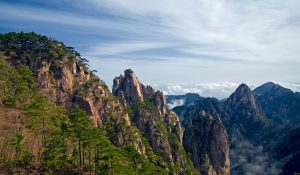
Chi King https://www.flickr.com/photos/8285539@N07/1017417967
For thirty Yuan—ten U.S. dollars at the time—we bought a lock at a government-owned kiosk. For lifelong love, they engraved on it the Chinese character for “love.”

Alongside natives and enthusiastic tourists, we secured our brass padlock to the fence. Various locks suspended there called for good health, safe travels, prosperity and more.
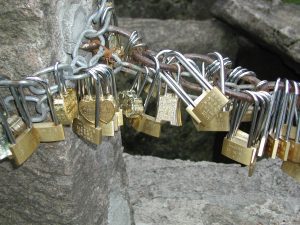 Older bunches of brass hearts, squares, rectangles, and circles resembled barnacles encrusted on scrap metal. Some hung in great worshipping hordes around incense burners. We spotted a man touching his forehead to an impressively large specimen boding well for his small business, a limping man hanging a lock for a healed knee, a couple holding their baby’s hand on a lock wishing for longevity. This was where lovers secured combined names onto railings and threw away the keys.
Older bunches of brass hearts, squares, rectangles, and circles resembled barnacles encrusted on scrap metal. Some hung in great worshipping hordes around incense burners. We spotted a man touching his forehead to an impressively large specimen boding well for his small business, a limping man hanging a lock for a healed knee, a couple holding their baby’s hand on a lock wishing for longevity. This was where lovers secured combined names onto railings and threw away the keys.
Though some of the locks had clung so long their blackened hopes are illegible, their promises of success, good luck and lasting love remained in spirit. This was the perfect way for us to end our China trip. Less than a month. Too short of a visit? Yes, with so much more we would have loved to see. Luckily, it turned out to be only the first of many trips to China. This first nibble, however was the one that would be the inspiration for many of my writing projects.
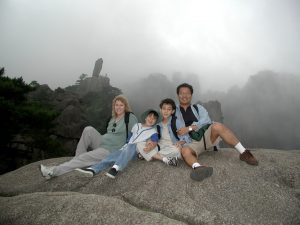
Karen Lin & Family
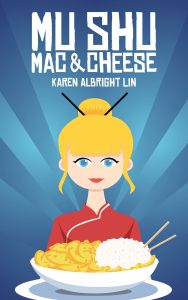
About the books:
With her household the subject of a reality show, food writer Elaine’s professional dreams are about to come true. But her dominating Chinese mother-in-law shows up pureeing all hope with culture clash chaos.
Mu Shu Mac & Cheese is interracial humor exploring how far a Midwest-born foodie will go to save her family from being sliced and diced. It is Julia Child meets My Big Fat CHINESE Wedding under the lens of a reality show.
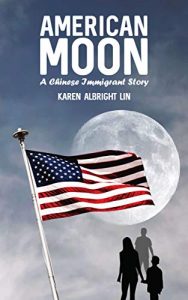
Karen Albright Lin’s novel, American Moon: A Chinese Immigrant Story, reached #5 on Amazon’s HOT NEW RELEASES list in its category (Asian American Literature and Fiction) within a week of being published on Kindle in June of 2020.
American Moon is the true saga of one family’s struggle to escape Chinese Communism, survive unjust incarceration and homelessness in Taiwan, and ultimately move to America where they think the moon shines brighter.
About the Author: Karen Albright Lin is an award-winning author of many genres and a produced screenwriter. Her novels, American Moon: A Chinese Immigrant Story and Mu Shu Mac & Cheese are available on Amazon. She’s also a freelance editor for bestselling and award-winning authors, and a cruise ship speaker. She’s published many short works and worked with a Hollywood agent and top New York agents. www.karenalbrightlin.com


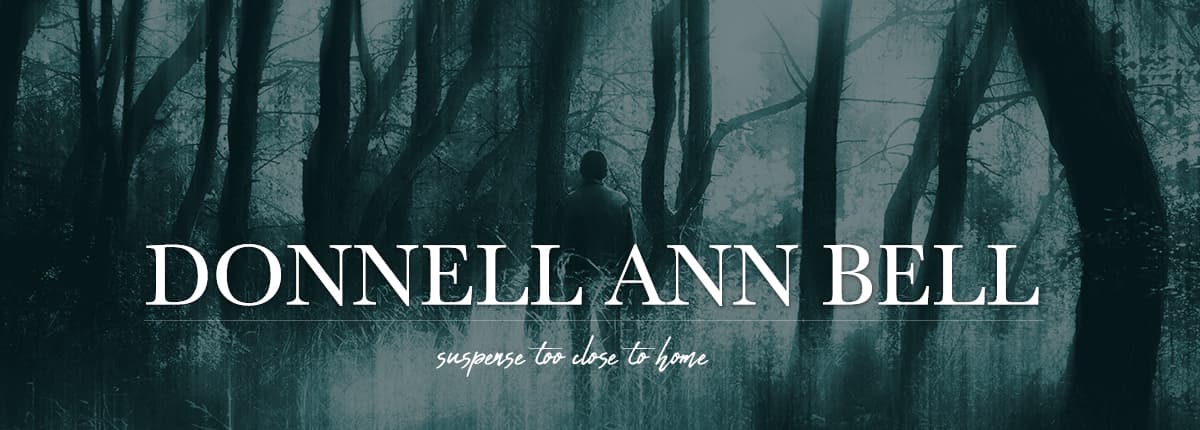
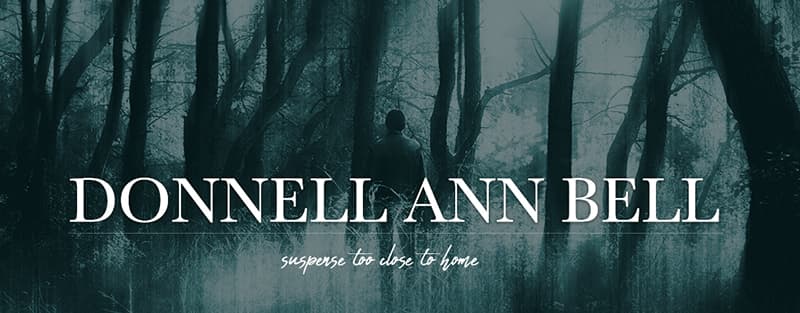







I have contemplated a Chinese river cruise, but with COVID now, the two I have scheduled for next year are iffy. So maybe in the future. I love cartoon covers and the Mu Shu one is adorable. Thanks for sharing your adventures.
Vicki, I hope you get a chance to go after this difficult time passes. It might change your perception of Chinese people, their food, their daily lives, and hospitality. I came back that first time feeling as if I’d just checked off a big bucket list item… one I didn’t know was on the list until I’d been there.
Karen, I found your blog so enlightening. We’re in an era right now where fear reigns supreme. Thank you for pointing out the humanity throughout this post. My son went to China at age twelve. He went to play baseball, so didn’t get to see too much as they were either on the field, a hotel, or a tourist spot. Travel opens our eyes. That must be why you have such incredible insights and vision. Thank you for blogging with me, my friend!
My pleasure! Any time! Thanks again for giving me the opportunity!
Aaah! China. I was booked on a 2-week tour to China and then 9/11 happened. I prayed I would get sick so I could cancel for health reasons. I didn’t get sick – and a few weeks later we flew off. It was the most incredible trip I EVER did – and I had travelled quite a bit! We did a 1-week Yangtze River cruise just before the whole area was flooded, we talked to people who refused to leave and would rather die in their huts that were their homes. They didn’t want to move into the apartment blocks the government had built for them. I made friends with the ship’s female doctor who spoke English and who told me many stories. The 2. week was like a trip into fantasy land. Shanghai, Beijing and Tiananmen Square, the forbidden city and visiting some of the ‘castle retreats’ of a Chinese Queen, and many more places… the shopping for gifts was a dream, factories, also outlaying villages where they had a donkey pulling a beam, going around and around to pump water up… the tuck-tucks, talking to well-dressed schoolchildren and street cleaners. It was all like living in the tale “Thousand-and-one-night.” Oh yes, I like to tell you more about it! I’ll have a chapter about it in my forthcoming book # 3 in my memoir trilogy, “Flight Into The Unknown.” I loved reading this account of Karen’s experience.
Giselle, sounds like you too found it pretty life-changing. We’ve gone back several times since and never run out of things to see there. Fun place. I hope it doesn’t become harder to travel there in the near future.